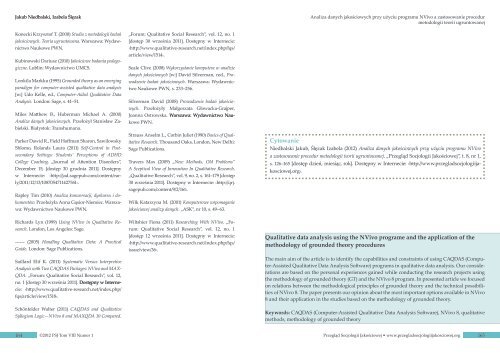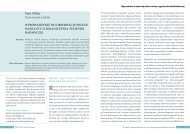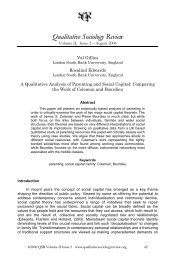AnAlIzA dAnych
AnAlIzA dAnych
AnAlIzA dAnych
You also want an ePaper? Increase the reach of your titles
YUMPU automatically turns print PDFs into web optimized ePapers that Google loves.
Jakub Niedbalski, Izabela Ślęzak<br />
Konecki Krzysztof T. (2000) Studia z metodologii badań<br />
jakościowych. Teoria ugruntowana. Warszawa: Wydawnictwo<br />
Naukowe PWN.<br />
Kubinowski Dariusz (2010) Jakościowe badania pedagogiczne.<br />
Lublin: Wydawnictwo UMCS.<br />
Lonkila Markku (1995) Grounded theory as an emerging<br />
paradigm for computer-assisted qualitative data analysis<br />
[w:] Udo Kelle, ed., Computer-Aided Qualitative Data<br />
Analysis. London: Sage, s. 41–51.<br />
Miles Matthew B., Huberman Michael A. (2000)<br />
Analiza danych jakościowych. Przełożył Stanisław Zabielski.<br />
Białystok: Transhumana.<br />
Parker Dawid R., Field Hoffman Sharon, Sawilowsky<br />
Shlomo, Rolands Laura (2011) Self-Control in Postsecondary<br />
Settings: Students’ Perceptions of ADHD<br />
College Coaching. „Journal of Attention Disorders”,<br />
December 15, [dostęp 30 grudnia 2011]. Dostępny<br />
w Internecie: ‹http://jad.sagepub.com/content/early/2011/12/13/1087054711427561›.<br />
Rapley Tim (2010) Analiza konwersacji, dyskursu i dokumentów.<br />
Przełożyła Anna Gąsior-Niemiec. Warszawa:<br />
Wydawnictwo Naukowe PWN.<br />
„Forum: Qualitative Social Research”, vol. 12, no. 1<br />
[dostęp 30 września 2011]. Dostępny w Internecie:<br />
‹http://www.qualitative-research.net/index.php/fqs/<br />
article/view/1514›.<br />
Seale Clive (2008) Wykorzystanie komputera w analizie<br />
danych jakościowych [w:] David Silverman, red., Prowadzenie<br />
badań jakościowych. Warszawa: Wydawnictwo<br />
Naukowe PWN, s. 233–256.<br />
Silverman David (2008) Prowadzenie badań jakościowych.<br />
Przełożyły Małgorzata Głowacka-Grajper,<br />
Joanna Ostrowska. Warszawa: Wydawnictwo Naukowe<br />
PWN.<br />
Strauss Anselm L., Corbin Juliet (1990) Basics of Qualitative<br />
Research. Thousand Oaks, London, New Delhi:<br />
Sage Publications.<br />
Travers Max (2009) „New Methods, Old Problems”<br />
A Sceptical View of Innovation In Qualitative Research.<br />
„Qualitative Research”, vol. 9, no. 2, s. 161–179 [dostęp<br />
30 września 2011]. Dostępny w Internecie: ‹http://qrj.<br />
sagepub.com/content/9/2/161›.<br />
Wilk Katarzyna M. (2001) Komputerowe wspomaganie<br />
jakościowej analizy danych. „ASK”, nr 10, s. 49–63.<br />
Cytowanie<br />
Niedbalski Jakub, Ślęzak Izabela (2012) Analiza danych jakościowych przy użyciu programu NVivo<br />
a zastosowanie procedur metodologii teorii ugruntowanej. „Przegląd Socjologii Jakościowej”, t. 8, nr 1,<br />
s. 126–165 [dostęp dzień, miesiąc, rok]. Dostępny w Internecie: ‹http://www.przegladsocjologiijakosciowej.org›.<br />
Analiza danych jakościowych przy użyciu programu NVivo a zastosowanie procedur<br />
metodologii teorii ugruntowanej<br />
Richards Lyn (1999) Using NVivo in Qualitative Research.<br />
London, Los Angeles: Sage.<br />
------ (2005) Handling Qualitative Data: A Practical<br />
Guide. London: Sage Publications.<br />
Saillard Elif K. (2011) Systematic Versus Interpretive<br />
Analysis with Two CAQDAS Packages: NVivo and MAX-<br />
QDA. „Forum: Qualitative Social Research”, vol. 12,<br />
no. 1 [dostęp 30 września 2011]. Dostępny w Internecie:<br />
‹http://www.qualitative-research.net/index.php/<br />
fqs/article/view/1518›.<br />
Schönfelder Walter (2011) CAQDAS and Qualitative<br />
Syllogism Logic—NVivo 8 and MAXQDA 10 Compared.<br />
Wiltshier Fiona (2011) Researching With NVivo. „Forum:<br />
Qualitative Social Research”, vol. 12, no. 1<br />
[dostęp 12 września 2011]. Dostępny w Internecie:<br />
‹http://www.qualitative-research.net/index.php/fqs/<br />
issue/view/36›.<br />
Qualitative data analysis using the NVivo programe and the application of the<br />
methodology of grounded theory procedures<br />
The main aim of the article is to identify the capabilities and constraints of using CAQDAS (Computer-Assisted<br />
Qualitative Data Analysis Software) programs in qualitative data analysis. Our considerations<br />
are based on the personal experiences gained while conducting the research projects using<br />
the methodology of grounded theory (GT) and the NVivo 8 program. In presented article we focused<br />
on relations between the methodological principles of grounded theory and the technical possibilities<br />
of NVivo 8. The paper presents our opinion about the most important options available in NVivo<br />
8 and their application in the studies based on the methodology of grounded theory.<br />
Keywords: CAQDAS (Computer-Assisted Qualitative Data Analysis Software), NVivo 8, qualitative<br />
methods, methodology of grounded theory<br />
164 ©2012 PSJ Tom VIII Numer 1<br />
Przegląd Socjologii Jakościowej • www.przegladsocjologiijakosciowej.org 165

















